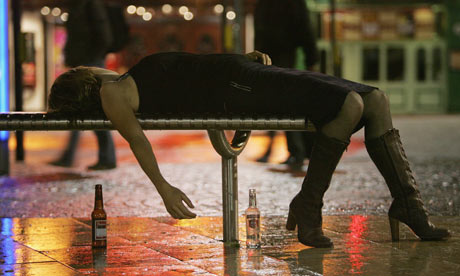
Excessive New Year's Eve revelry could inflict a £23m hangover on the NHS as it deals with the consequences of binge drinking, it is claimed today.
And as other research showed that those who drink at home imbibe dangerously large measures, one thinktank has proposed that severely intoxicated people admitted to hospital should pay the price – £532 – of their short-term treatment as an alcohol awareness lesson.
A phalanx of health warnings have been issued ahead of what is traditionally the busiest period for alcohol-related hospital admissions.
Policy Exchange, a centre-right thinktank, produced its figure of £23m for the NHS bill based on estimates of visits to A&E departments, ambulance callouts and inpatient services today and tomorrow.
"The costs of being admitted to hospital to sleep off alcoholic excess should be met by individuals, not the NHS," it suggests. "Those admitted to hospital for less than 24 hours with acute alcohol intoxication should be charged the NHS tariff cost for their admission of £532."
The Department of Health also releases research today showing that people drinking spirits at home in England give themselves more than double what they would get in a pub if they ordered a single shot.
Experiments with drinkers in London, North Shields and Liverpool found that average "home barmen" pour 57ml when they drink a spirit such as vodka, gin or whisky – 32ml more than a standard single 25ml measure.
"If that average English drinker knocked back eight spirits drinks over a week at home, they would be drinking nearly half a litre (456ml) of vodka, gin or whisky," the study found, "compared to 200ml if they'd ordered the same number of single measures in a pub or bar."People aged 31 to 50 were shown to be the most generous decanters while men poured out larger measures than women. Larger wine glasses also encouraged drinkers to overestimate what constitutes a single unit of alcohol.
Those asked to pour the equivalent of one unit into a large wine glass (250ml), on average dispensed 157ml. The same experiment carried out with a smaller glass (175ml), resulted in an average measure of 131ml. The correct quantity for 13% strong wine should have been 76.25ml.
Professor Ian Gilmore, president of the Royal College of Physicians, who chairs the Alcohol Health Alliance, said: "It is worrying that people have little appreciation of how much they are drinking when serving themselves, especially given the rise in home drinking fuelled by cheap alcohol from supermarkets. Part of this lack of awareness comes from ever larger glass sizes and drinks such as wine and beer increasing in strength."

